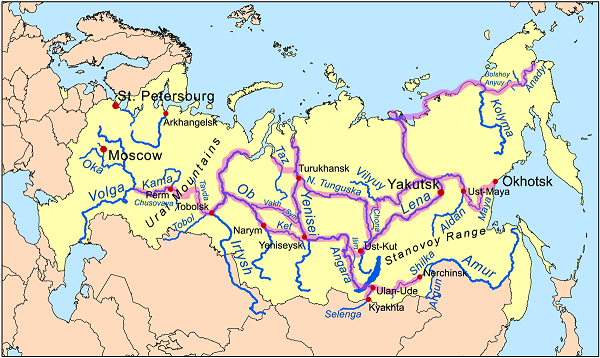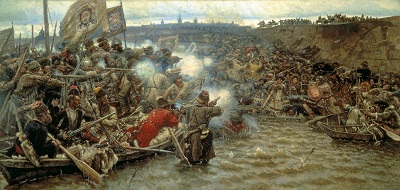This series has six easy 5 minute installments. This first installment: Prelude to the Siberian Conquest.
Introduction
If the region of the world that gets the least attention from historians is not the immense territory of Siberia then it surely ranks close. Even as late as the reign of Ivan IV (“the Terrible”) next to nothing of these lands by the outside world, even to its neighbors Russia and China. China had build the Great Wall to keep the Siberians out; Russia attacked them. (“Siberians” being used loosly to include Mongolians and all of the peoples east of Russia and north of China.) This region remains little known to outsiders to this day.
This selection is from History of the Russian State by Nikolay M. Karamzin published in 1826.
The first of the great Russian historians Nikolai Karamzin, himself under-appreciated, wrote his great epic. We herewith extracted a passage from his book translated by Chauncey C. Starkweather. And now, Nikolay M. Karamzin.
Time: 1581
Place: Siberia

CC BY-SA 3.0 image from Wikipedia.
Among the enterprising leaders of the Cossacks at this time were Yermak Timofeif, John Koltzo–condemned to death by the Czar–James Mikhailoff, Necetas Pan, and Matthew Meschteriak, all noted for their rare intrepidity. The Stroganoffs, having heard of the terror inspired by their audacity among peaceful travelers, as well as amid the nomad tribes of the neighborhood, proposed an honorable service to these five brave men. On April 6, 1579, they sent them presents, accompanied by a letter in which they urged them to quit an occupation unworthy of Christian soldiers, to leave the class of brigands, and to become warriors of the White Czar, the monarch of Muscovy; to seek, in fine, dangers exempt from dishonor, by making peace with God and Russia. “We have,” they added, “lands and fortresses, but few soldiers; come and defend great Perm and the Christian countries of the North.” At these propositions Yermak and his companions shed tears of emotion. The hope of effacing their disgrace by glorious deeds, by services rendered to the State, the idea of exchanging the title of audacious brigands for that of brave defenders of their country, caused a keen sensibility in these men, uncouth, if you will, but with hearts still susceptible of remorse. Unfurling their standard on the bank of the Volga, they made an appeal to their comrades, and assembled five hundred fifty bold partisans, at the head of whom they arrived, burning with zeal, in the presence of the Stroganoffs, who received them with joy, as the annalist relates. The desires of the former, the promises of the latter, were realized. The Cossack leaders became the bucklers of the Christian country. The infidels trembled at the aspect of death which met them wherever they dared to show themselves. Indeed, on July 22, 1581, the Cossacks completely overthrew the mirza Begouly, who at the head of seven hundred Vogulitches and Ostiaks, had ravaged the colonies founded upon the Silva and the Tchusovaya. This success was the forerunner of more considerable advantages.
The Stroganoffs had in view not merely the defense of their cities, in calling the Cossacks to their service. When they had sufficiently tested the courage and fidelity of these warriors, and had learned the talent and boldness of Yermak Timofeif, their principal leader–of obscure origin, the annals say, but illustrious by his greatness of soul–they formed a troop especially composed of Tartars subject to Russia, of Lithuanians and of Germans, ransomed from captivity among the Nogais, for the latter brought, as a matter of custom in their encampments, the prisoners whom they made in war, as mercenaries of the Czar. In fine, after having made provisions of arms and of food, the Stroganoffs openly announced an expedition, which, under the orders of Yermak, should have Siberia for its objective point. The number of fighting men amounted to eight hundred forty, all animated with zeal and transported with joy. Some dreamed of honor, others thought of the spoils. The hope of meriting their pardon by the Czar inflamed the Cossacks, and the German or Polish captives, who sighed for liberty, considering Siberia the road to their fatherland. Yermak began by organizing his little army. He named the hetmans, subaltern officers, and appointed the brave John Koltzo as second in command. Long-boats were laden with munitions of war and food, light artillery and long arquebuses. He procured guides, interpreters, priests, had prayers said, and received the final instructions of the Stroganoffs. The latter were conceived in the following terms: “Go in peace to scour the country of Siberia and put to flight the impious Kutchum.” After having taken the oath of valor and chastity, Yermak set out, on September 1, 1581, at the sound of warlike trumpets, on the Tchusovaya, and directed his march toward the Ural Mountains, preparing himself for great activity, without counting upon any assistance. This expedition was even made without the knowledge of the Czar, for the Stroganoffs, who had obtained the grant of the countries situated on the other side of the chain of rocky mountains, thought themselves able to dispense with soliciting of the Czar a new sanction for their important enterprise. We shall see that Ivan did not share this opinion.

Public domain image from Wikipedia.
At the moment when the states of Kutchum were to become the conquest of the Russian Pizarro–as redoubtable for the savages as he of Spain, but less terrible for humanity–the Prince of Pelim with the Vogulitches, the Ostiaks, the Siberian Tartars, and the Bashkirs made a sudden irruption upon the borders of the Kama. He destroyed the Russian colonies near Tcherdin, Ussolie, as well as many other new fortresses of the Stroganoffs, and put to death or dragged into captivity a great number of Christians who were deprived of defenders. But at the news of the march of the Cossacks against Siberia he left our frontiers to fly to the defense of his own states.
The crime of these depredations was laid to the Stroganoffs. Upon a report of Basile Pilepitsin, Governor of Tcherdin, Ivan wrote him that he was either unable on unwilling to look after the frontiers. “You have taken upon yourself,” he added, “to recall proscribed Cossacks, true bandits, whom you have sent to make war upon Siberia. This enterprise, suited to irritate the Prince of Pelim and the sultan Kutchum, is a treason worthy of the last punishment! I command you to cause Yermak and his companions to start without delay for Perm and Ussolie on the Kama, where they may be able to efface their faults by forcing the Ostiaks and the Vogulitches to submission. You may retain at the most one hundred Cossacks for the security of your little towns. In case you shall not execute my commands to the letter, if in the future Perm has still to suffer the attacks of the Prince of Pelim or of the Sultan of Siberia, I shall overwhelm you with the weight of my disgrace and I shall have all those traitors of Cossacks hanged.” This menacing despatch made the Stroganoffs tremble. Nevertheless, a brilliant, unexpected success justified their enterprise and changed into favor the wrath of their sovereign.
| Master List | Next—> |
More information here.

Like!! I blog frequently and I really thank you for your content. The article has truly peaked my interest.